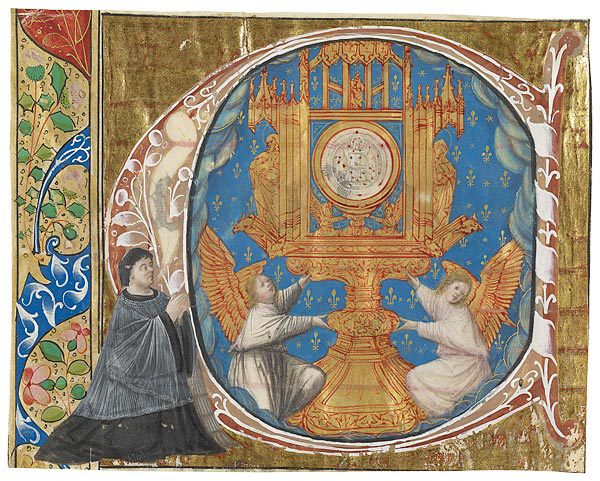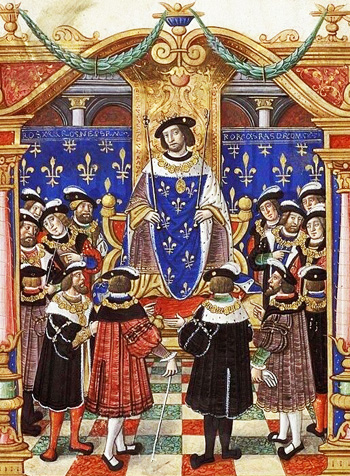Stories & Legends
 |
 |
 |
 |
 |
 |
 |
‘Blessed Are They Who Do Not See and Believe’
At the elevation the faithful should raise their eyes to the altar and gaze reverently at the Adorable Sacrament. This is pleasing to God and profitable to one's own soul, as Christ condescended to reveal to one of His saints in these words:
 "As often as any one looks in devout adoration at the sacred host or, being unable, wishes that he could do so, his reward in Heaven is increased, and he is entitled to a special degree of bliss in the enjoyment of the beatific vision."
"As often as any one looks in devout adoration at the sacred host or, being unable, wishes that he could do so, his reward in Heaven is increased, and he is entitled to a special degree of bliss in the enjoyment of the beatific vision."
This is indeed a rich recompense for our devout contemplation of the Sacred Host. Let us not lose it by our own neglect. ...
When the Sacred Host is lifted up in our sight, it is above all things necessary to awaken a lively faith in the real, personal presence of Our Blessed Lord in the Sacred Host, as our Creator and our Redeemer, making the oblation of himself to God the Father for us miserable sinners.
This exercise of faith is highly meritorious, because we believe that which is contrary to the evidence of our senses, above the grasp of our understanding. How much we merit by this act of faith Christ himself tells us: "Blessed are they that have not seen, and have believed." (Jn 20: 29.) That is to say: Those who, although they are unable to see Me in the Adorable Sacrament, yet firmly believe Me to be present in it, exercise so excellent a virtue that by it they may earn eternal felicity. The more often we do this the greater will be our share of grace here and of glory hereafter.
The Vision of Hugh of Saint Victor
The following incident, taken from the life of the famous Saxon theologian Hugh of St. Victor (1086-1141), bears the same testimony.
It had long been the earnest desire of this pious priest to behold Our Lord in the consecrated Host, and many were his prayers to obtain that favor. At last his prayer was granted and his desire fulfilled.
One day, while he was saying Mass, he saw the Divine Child reposing upon the corporal. His joy and the consolation he experienced were boundless, but presently the Divine Child whispered to him: "Because thou hast thus seen Me with thy bodily eyes, O Hugh, thou hast lost all the merit of faith."
Thereupon the Infant vanished from sight, leaving the priest as full of regret for the merit he had lost as he had been of delight at the visible presence of his Lord.
Let this example serve to strengthen our faith, and at the same time encourage us by the assurance that we merit greatly in the sight of God when we look upon the Sacred Host and make an act of steadfast faith.
The Admirable Faith of St. Louis
 St. Louis of France (1214-1270) was deeply impressed with the value of faith. One day, when a priest who was celebrating the holy sacrifice in the palace chapel elevated the Sacred Host, all who were present beheld in its place a lovely Infant.
St. Louis of France (1214-1270) was deeply impressed with the value of faith. One day, when a priest who was celebrating the holy sacrifice in the palace chapel elevated the Sacred Host, all who were present beheld in its place a lovely Infant.
A servant went running to the King, who was not in the chapel at the time, begging him to hasten thither to see this wondrous sight.
But Louis calmly replied: "Let unbelievers go to look upon the Divine Child. I, for my part, am so firmly convinced of His personal presence in the Sacred Host that I do not care for further evidence."
It cannot be supposed that this pious King did not feel a natural desire to see the beauteous Infant. But he denied himself the gratification that the sight would have afforded him in order not to lose the merit of believing what he had not seen, thus gaining a higher degree of glory.
Imitate this good King, and however greatly you may desire to behold Christ in the Sacred Host, content yourself with believing and comfort yourself with the thought that you wilt see thy Lord in His glory all the more clearly hereafter.



We should look upon the Sacred Host and adore Christ
This is indeed a rich recompense for our devout contemplation of the Sacred Host. Let us not lose it by our own neglect. ...
When the Sacred Host is lifted up in our sight, it is above all things necessary to awaken a lively faith in the real, personal presence of Our Blessed Lord in the Sacred Host, as our Creator and our Redeemer, making the oblation of himself to God the Father for us miserable sinners.
This exercise of faith is highly meritorious, because we believe that which is contrary to the evidence of our senses, above the grasp of our understanding. How much we merit by this act of faith Christ himself tells us: "Blessed are they that have not seen, and have believed." (Jn 20: 29.) That is to say: Those who, although they are unable to see Me in the Adorable Sacrament, yet firmly believe Me to be present in it, exercise so excellent a virtue that by it they may earn eternal felicity. The more often we do this the greater will be our share of grace here and of glory hereafter.
The Vision of Hugh of Saint Victor
The following incident, taken from the life of the famous Saxon theologian Hugh of St. Victor (1086-1141), bears the same testimony.
It had long been the earnest desire of this pious priest to behold Our Lord in the consecrated Host, and many were his prayers to obtain that favor. At last his prayer was granted and his desire fulfilled.
One day, while he was saying Mass, he saw the Divine Child reposing upon the corporal. His joy and the consolation he experienced were boundless, but presently the Divine Child whispered to him: "Because thou hast thus seen Me with thy bodily eyes, O Hugh, thou hast lost all the merit of faith."
Thereupon the Infant vanished from sight, leaving the priest as full of regret for the merit he had lost as he had been of delight at the visible presence of his Lord.
Let this example serve to strengthen our faith, and at the same time encourage us by the assurance that we merit greatly in the sight of God when we look upon the Sacred Host and make an act of steadfast faith.
The Admirable Faith of St. Louis

Courtiers come before the throne of King Louis IX
A servant went running to the King, who was not in the chapel at the time, begging him to hasten thither to see this wondrous sight.
But Louis calmly replied: "Let unbelievers go to look upon the Divine Child. I, for my part, am so firmly convinced of His personal presence in the Sacred Host that I do not care for further evidence."
It cannot be supposed that this pious King did not feel a natural desire to see the beauteous Infant. But he denied himself the gratification that the sight would have afforded him in order not to lose the merit of believing what he had not seen, thus gaining a higher degree of glory.
Imitate this good King, and however greatly you may desire to behold Christ in the Sacred Host, content yourself with believing and comfort yourself with the thought that you wilt see thy Lord in His glory all the more clearly hereafter.

Excerpt from Cochem's Explanation of the Holy Sacrifice of the Mass,
Benzinger Bros.: 1896, pp. 342=344
Posted August 26, 2017
Benzinger Bros.: 1896, pp. 342=344
Posted August 26, 2017






